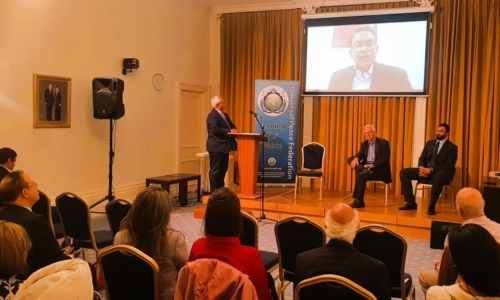‘West should listen more and lecture less’
TDT | Manama
The Daily Tribune – www.newsofbahrain.com
By P. Unnikrishnan, Chairman & Managing Editor
In a thought-provoking and eye-opening discussion convened by the Universal Peace Federation UK, experts gathered to examine the ‘Global South Perspectives on the Russia-Ukraine War and Consequent Geopolitical Tensions.’
The conversation centred around whether the rules-based order, championed by the ‘Global West’ since World War II, is on the brink of obsolescence, echoing the sentiments of Humphrey Hawksley.
The panel comprised distinguished figures in the world of media and international relations.
Humphrey Hawksley, a former BBC World Correspondent and renowned author, and Muhammad Hussein, Staff Writer and Political Analyst for the Middle East Monitor, were present at the Universal Peace Federation-UK’s headquarters in London.
Meanwhile, P. Unnikrishnan, chairman of the Bahrain Daily Tribune, joined the discussion remotely.
Lack of understanding
Moderator Keith Best, Chair of the Universal Peace Federation UK, started the discussion by highlighting a significant issue—the lack of understanding in the ‘West’ regarding the perspectives of ‘the Global South.’
A recurring theme emerged throughout the evening: the West often lectures rather than listens to the Global South.
Humphrey Hawksley eloquently conveyed the contrast between the comfortable lives of UK citizens living in an orderly, well-governed society and the hardships faced by many in the Global South.
He acknowledged his hesitance to speak, as his privilege might undermine his credibility as a representative of the Global South.
Hawksley emphasised that the ‘Global West,’ with whom he interacts daily as a journalist, tends to ignore pressing issues countries like those in the Sahel face.
Instead, they offer condescending advice, such as promising to build roads only if the nation conducts free and fair elections. Hawksley also lamented the paralysis of the United Nations Security Council in responding to the Russian-Ukrainian war and listed several instances where the rules-based order failed to address international law violations.
He forewarned the emergence of a rival system to the Global West’s rules-based order due to its lecturing approach.
In closing, he left a sad thought: unless this practice changes, the Global West may lose its grip on international affairs.
The nation-state
Muhammad Hussein offered insights into the century-old concept of the nation-state, initiated by the West.
Historically, when the borders of nation-states were threatened, the West intervened forcefully to protect them.
However, Russia’s attempts to alter boundaries by integrating Ukrainian territories challenge this norm.
Hussein emphasised that Russia isn’t a saviour but rather another superpower to be navigated by nations in the Global South.
Middle powers like Saudi Arabia, India, and Turkey play a crucial role in this balancing act.
The rise of these middle powers challenges the Western global order and the expansion of BRIC nations and the multi-aligned world.
Hussein predicted that by 2030, a new geopolitical order would emerge, but the outcome remains uncertain.
Who benefited from the war?
P. Unnikrishnan reiterated Hawksley’s call for the West to listen more and lecture less.
He emphasised the far-reaching changes brought about by the conflict, dividing the world into two ideologically separated power blocks.
Unnikrishnan questioned who benefited from the war, pointing to reports suggesting that China stockpiled critical resources before the conflict, possibly indicating prior knowledge of the invasion.
He also noted the explosion of the Nord Stream gas pipeline, which could have benefited the United States in its gas exports to Europe.
His empathy for the Global South’s struggling nations in this evolving world was unmistakable.
The war has disrupted trade patterns and resource availability, disproportionately affecting poorer countries with rising prices and increased poverty levels.
Unnikrishnan urged the West to respect the decisions of Global South nations as they grapple with economic difficulties.
Collaboration and diplomacy, he stressed, are essential in navigating this crisis.
He said that nations from the Global South mustn’t be coerced into choosing sides in this conflict; instead, they must be free to make decisions that serve the best interests of their citizens and country, and others should respect their choices.
Related Posts

